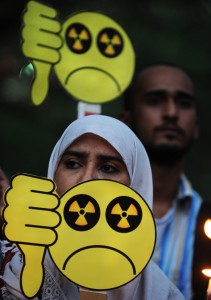The struggle for the right to information, local consent, and a healthy environment has gone on for years at the site of the Kudankulam Nuclear Power Plant – at India’s far southern tip. Now, after the disastrous failure of the Fukushima nuclear plant in Japan, and with the Kudankulam plant nearing completion, the protests have intensified.
And so has the repression of over 100,000 protesters’ rights to gather peacefully and speak up against the plant.
On one side are opponents of the plant, mostly local, who fear that proper safety precautions have not been taken at a site affected by tsunamis and earthquakes. They would surely bear the heaviest burden should anything go wrong at the plant.
Some have asked why the plant is being built in remote rural Tamil Nadu instead of near Delhi. They have not been properly informed or consulted by authorities about the plant and its risks, which threatens the lives and livelihoods of these fishing communities. Protesters have peacefully demonstrated, carried out extended hunger strikes, and surrendered their voter IDs in protest. SEE THE REST OF THIS POST
